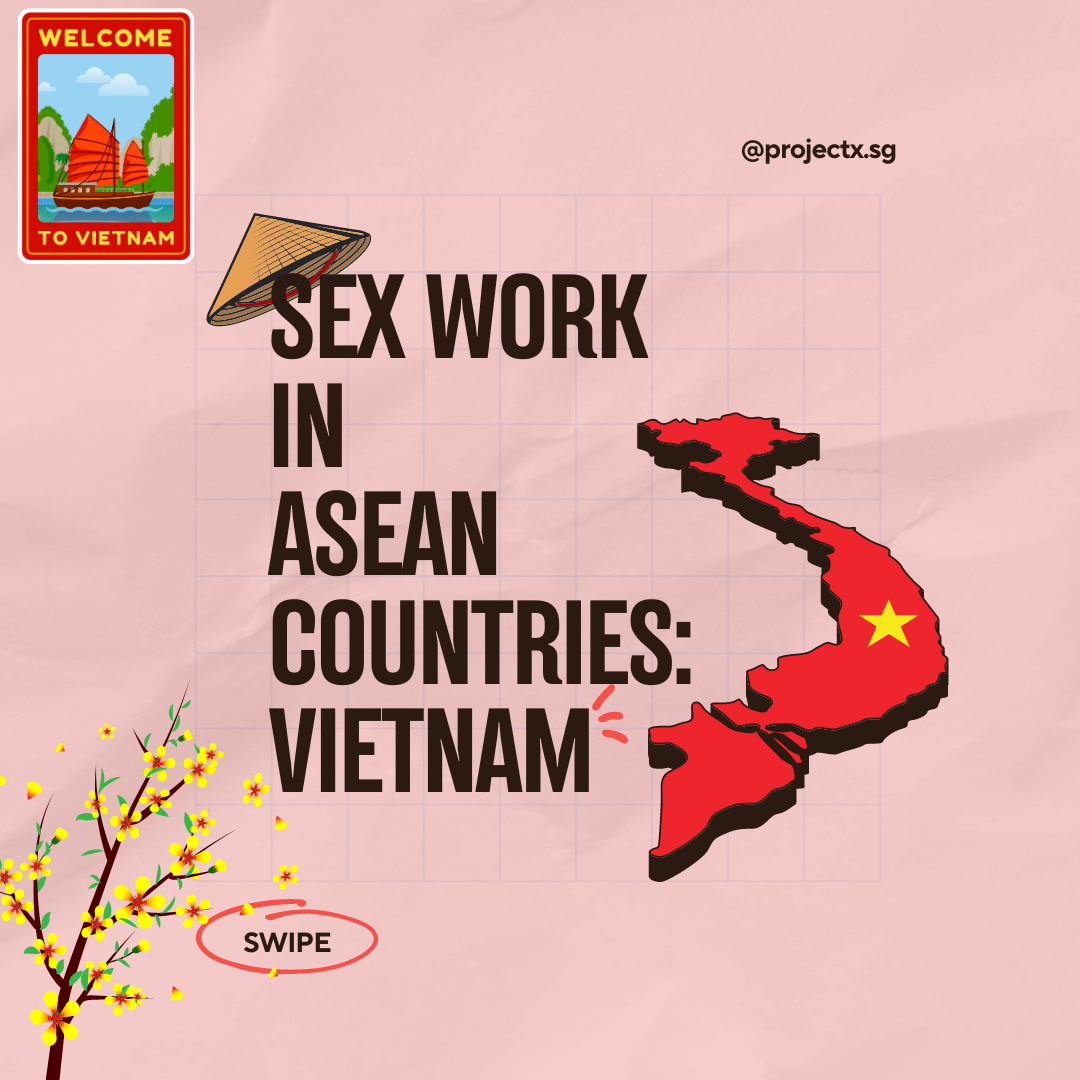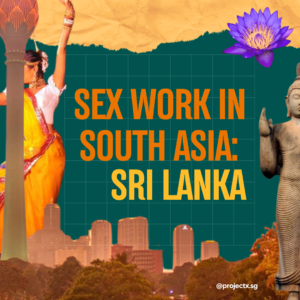Preface: This is the fourth post in Project X’s new series ‘Sex work in ASEAN nations’ – a series designed to encourage greater understanding of, and dispel common myths about, sex work in the region. This series will consider the state of the sex industry and sex workers rights in each of the 10 ASEAN countries. It will consider the unique historical, cultural, political and economic circumstances of that country, as well as why the decriminalisation of the industry is crucial for the region’s economic and political development.
A Brief History of Sex Work in Vietnam
The sex industry in Vietnam predates the French colonial era and has continued through reunification and into the present day. The sex industry in Vietnam is best conceptualised through three distinct periods: the French colonial period (1884-1954), the American war in Vietnam (1955-1975), and the Đổi Mới era (1986-present).
French Colonial Period (1884 – 1953)
During the French colonial period, sex work was legal. Sex work was considered a ‘natural outlet’ for French and other European men’s sexual needs because men were seen as inherently more sexual than women, and male abstinence was considered impossible. However, despite its legality, the sex industry was strictly regulated. Sex workers were required to register with officials and to present themselves for regular health examinations. If they were infected with any form of STI they could be detained for months in a nhà lục xì/dispensaire until they were cured. Non-registered sex workers were also subject to the same detention if caught and found to have an STI. Perhaps though, the greatest restriction on a registered sex worker’s freedom in colonial Vietnam was their inability to exit the industry. Once given a licence, a woman would not be able to legally change her professional status and would need a man (either her husband or father) to annul it. These regulations were problematic as they were primarily concerned with regulating relationships between the coloniser (French men) and the colonised (Vietnamese women), thus serving to uphold white supremacy and patriarchy.
American War in Vietnam (1955 – 1975)
During the American war, despite the fact that sex work became illegal, regulations eased. Women were no longer forced to stay in dispensaries, and theoretically women could freely exit the sex industry at any time. Both Vietnamese and American officials turned a blind eye to the existence of sex workers during this period. In fact, it is arguable that officials actively encouraged the sex industry. Whilst the official policy of the U.S Department of Defense was to suppress the industry, the U.S military relied on sex workers to help ease American soldiers into the country and the war effort. Equally so, Vietnamese officials seemed to endorse the national benefits of an operational sex industry with one official saying “the Americans need girls. We need dollars. Why should we refrain from the exchange?”. Consequently, by the end of the war, estimates put the number of sex workers in the country as anywhere between 300,000 and 500,000.
Đổi Mới era (1986-present)
Following the end of the American war (1975), sex work became much more strictly enforced and morally condemned. In the Vietnamese state’s official discourse, sex work became a ‘social evil’. But by 1986 the beginning of the Đổi Mới era meant that the sex trade emerged once again despite its illegality. ‘Đổi Mới’ is the name given to the economic reforms initiated in Vietnam in 1986 with the goal of converting Vietnam’s economy from a command economy to a ‘socialist-oriented market economy’. One of the consequences of these reforms was the mass-commodification of sex in Vietnam. Sex work not only thrived as its own industry, but the trade of sexual services became ancillary to numerous other types of more ‘legtimiate’ business transactions. In her book, ‘The Ironies of Freedom’ Nguyen-vo examines how commonly pleasure was used as a tool to facilitate business transactions during this new era of economic liberalisation. So whilst during the Đổi Mới era and today, sex work is considered both extremely illegal and immoral, practically it is an omnipresent element of Vietnamese business culture.
Law, Policy, Policing
In Vietnam, sex work is illegal under administrative laws rather than under the Penal Code (although some certain offences may attract criminal sanctions under the Code). According to the 2003 ‘Ordinance on Prostitution Prevention and Combat’, the following acts are strictly prohibited:
- Buying sex;
- Selling sex;
- Harbouring prostitution;
- Organising prostitution activities;
- Forcing prostitution;
- Brokering prostitution;
- Protecting prostitution;
- Abusing the service business for prostitution activities;
- Other acts related to prostitution activities as prescribed by law.
Despite being governed by administrative law as opposed to a criminal law, Vietnamese sex workers were previously able to be detained under this ordinance. Article 23 of the ordinance empowered the Ministry of Labor, Invalids and Social Affairs (MOLISA) to detain and ‘re-educate’ sex workers in special centres called ‘05 centres, where women could be forced to remain for up to 2 years. In June 2012 the ‘Law on Administrative Sanctions’ ended the effect of Article 23 and resulted in the release of all sex workers detained in ‘05 centres. Fines are now given instead for all offences listed above.
Whilst generally fines are issued for sex-work related offences, the Penal Code 2000 provides that those who ‘harbour prostitutes’ shall be sentenced to between one and seven years of imprisonment. Where ‘harbouring’ involves some form of coercion, the penalty increases to
between five and fifteen years imprisonment.
Additionally, whilst according to the law, detention of sex workers is rare, practically it happens often. There are reports of periodic anti-prostitution police crackdowns. One report describes streets being blocked without warning and people being taken into custody unless they could prove that they had a legitimate reason to be on the street. Thus Vietnamese sex workers are always liable to fines, and sometimes may even be arbitrarily arrested and detained also.
Sex Worker Statistics & Their Economic Impact
Because sex work is illegal in Vietnam, and the government pushes a strong anti-sex work rhetoric, official statistics pertaining to sex work may not be entirely accurate. As of 2013, the Ministry of Labour, Invalids and Social Affairs (MOLISA) has estimated that there were 71,936 sex workers in the country. However in 2016 the ILO suggested there were some 101,272 sex workers in Vietnam. Independent researchers estimate the number is closer to 200,000.
The absence of official and accurate data regarding Vietnamese sex workers means that their percentage point contribution to Vietnam’s GDP is unknown. However, given other available data from countries within the region (Indonesia, Malaysia, Philippines and Thailand) which estimate that sex workers in those countries contribute anywhere from 2-14% of GDP, it’s reasonable to assume Vietnam’s statistics are not hugely dissimilar.
Whilst there isn’t data available specifically pertaining to sex work and GDP in Vietnam, a point should be made about remittances. According to the World Bank, 6% of Vietnam’s GDP is comprised of remittances (gifts of money). This makes Vietnam one of the ten biggest remittance beneficiaries globally. According to Hoang, in her book ‘Dealing in Desire: Asian Ascendancy, Western Decline, and the Hidden Currencies of Global Sex Work’, payment for sex work in the form of remittances is common. For example, many hostesses often receive regular remittances from Western clients/boyfriends, which, all inadvertently contribute to Vietnam’s gross domestic product.
Vietnamese Culture, Religion, and Social Norms
It’s important also to consider dominant cultural values in order to understand why both the Vietnamese government and Vietnamese society treat sex workers with condemnation. Vietnamese culture is strongly informed by Confucian beliefs. According to a 2014 study, traditional Confucian beliefs remain deeply entrenched in Vietnam, with Hanoians clinging to Confucianism more tightly than people living in Shanghai or Taipei.
In traditional Vietnamese society, the family is seen as a fundamental social unit and an individual’s behaviour reflects not only on themselves, but their family as well. Consequently, public appearance is of the utmost importance and so people, but women in particular, are encouraged to behave in ways which avoid the possibility of familial shame. The guiding principle of gender relations in Confucianism is ‘male as superior and women as subordinate’ (nan zun nv bei). Women should be passive, modest and permissive and should behave in ways which ensure they do not bring shame to themselves or their families.
Confucianism sees sexuality as taboo and forbids discussion about sex. It dictates that sex is morally acceptable when regulated by formal arrangements (like marriage) and culminates in childbirth. Consequently recreational sex is not acceptable. Sex work is morally condemned as it not only runs counter to Confucian values about when sex is and is not morally acceptable, but also because it subverts the expectation that women be subordinate, passive and non-sexual.
The Hope for Law Reform
For the better part of 10 years now, there has been fierce debate among researchers, officials, and lawmakers on whether the country should legalise sex work.
Calls to legalise sex work in Vietnam come in a variety of forms, and with various intentions. For instance, Phung Quoc Hien, the vice chairman of the legislative National Assembly, argued Vietnam should consider establishing red-light districts in certain ‘special economic zones’, a move which he advocated as a measure to boost business in those areas (as well as to keep ‘vice’ away from the city). Relatedly, Tran Van Dat, vice head of the Department of General Affairs on Legislative Development under the Ministry of Justice, agreed that ‘the state should legalise [sex work] and allow sex workers to operate in certain areas to manage the industry and minimize the transmission of sexual diseases’.
Others seem more explicitly concerned with the rights and welfare of sex workers. Cao Van Thanh, vice head of the Social Evil Prevention Department under the labour ministry stated that ‘sex workers should have the right to make a living, contribute to society, and enjoy welfare in terms of healthcare and education’. This is a valid concern, given the limited rights that Vietnamese sex workers have as a consequence of the illegality of their profession. A 2016 ILO study found that sex workers are some of the most vulnerable people in Vietnam, that they live in persistent fear of theft and violence, and that they cannot rely on police for assistance. It is for this reason that organisations such as the Vietnam Network of Sex Workers (VNSW) exist.
Linh, a former sex worker and member of the Vietnam Network of Sex Workers explains that her group provides sex workers with various services including self defence skills, and encourages them to stand up for one another and to act as a community. She says if ‘sex workers don’t stand up for one another, no one will bother to do so’. It is unfortunate that this has been the reality for sex workers in Vietnam for such a long time, but calls for legalisation do bring a glimmer of hope that police may become allies in times of need who serve to protect the rights of sex workers rather than enforce anti-sex worker laws.
However, we should also be cautious about proposals to legalise sex work in Vietnam. If Vietnamese colonial history tells us anything, it is that legalisation can be even more oppressive than the framework of regulation that Vietnam currently enforces. How Vietnam will respond to growing calls for reform remains to be seen, but if legalisation ensues, let’s hope history does not repeat itself.
Reference List
Anh, N. (2018) Vietnam’s sex industry and the sticky subject of legalizing it, VnExpress International . Available at: https://e.vnexpress.net/news/news/vietnam-s-sex-industry-and-the-sticky-subject-of-legalizing-it-3731520.html (Accessed: May 8, 2023).
Đổi mới (2023) Wikipedia. Wikimedia Foundation. Available at: https://en.wikipedia.org/wiki/%C4%90%E1%BB%95i_M%E1%BB%9Bi#:~:text=However%2C%20the%20%C4%90%E1%BB%95i%20M%E1%BB%9Bi%20Policy,the%20party%27s%206th%20National%20Congress (Accessed: May 5, 2023).
Gao, E. et al. (2012) “How does traditional Confucian culture influence adolescents’ sexual behavior in three Asian cities?,” Journal of Adolescent Health, 50(3). Available at: https://doi.org/10.1016/j.jadohealth.2011.12.002.
Goodwin, J. (2012) “Sex Work and the Law in Asia and the Pacific.” Bangkok: United Nations Development Programme.
Hoang, K.K. (2015) Dealing in desire: Asian ascendancy, western decline, and the hidden currencies of global sex work. Oakland, CA: University of California Press.
Hoang, K.K. (2015) “Sex Work in HCMC, 1867–Present,” in Dealing in desire: Asian ascendancy, western decline, and the hidden currencies of global sex work. Oakland, CA: University of California Press, pp. 26–39.
Huber, J. et al. (2019) “Exploring beliefs and experiences underlying self-stigma among sex workers in Hanoi, Vietnam,” Culture, Health & Sexuality, 21(12), pp. 1425–1438. Available at: https://doi.org/10.1080/13691058.2019.1566572.
Luong, D. (2016) Will Vietnam legalize prostitution?, The Diplomat. The Diplomat. Available at: https://thediplomat.com/2016/04/will-vietnam-legalize-prostitution/ (Accessed: May 5, 2023).
Luong, D. (2017) Top Vietnamese lawmaker calls for setting up ‘red-light areas’ in special economic zones, VnExpress International. Available at: https://e.vnexpress.net/news/news/top-vietnamese-lawmaker-calls-for-setting-up-red-light-areas-in-special-economic-zones-3640492.html (Accessed: May 8, 2023).
Nguyen, H.T.L. (2022) Prostitution in Vietnam in recent history: Continuities and discontinuities, Conflict, Justice, Decolonization: Critical Studies of Inter-Asian Societies. Available at: https://cjdproject.web.nycu.edu.tw/2022/04/11/prostitution-in-vietnam-in-recent-history-continuities-and-discontinuities/#:~:text=From%201975%20to%202012%2C%20prostitution,criminal%20offences%20by%20the%20law (Accessed: May 5, 2023).
Nguyen-Vo, T.-H. (2008) The Ironies of Freedom: Sex, Culture, and Neoliberal Governance in Vietnam. University of Washington Press.
Personal remittances, received (% of GDP) – vietnam (2020) World Bank Open Data. Available at: https://data.worldbank.org/indicator/BX.TRF.PWKR.DT.GD.ZS?end=2020&locations=VN&start=2000 (Accessed: May 5, 2023).
Prostitution or sex work in Vietnam is tolerated (2023) City Pass Guide. Available at: https://www.citypassguide.com/sex-work-or-prostitution-in-vietnam-is-tolerated/#:~:text=Prostitution%20is%20considered%20a%20necessary,still%20illegal%20in%20this%20country (Accessed: May 8, 2023).
Summary study report: Viet Nam’s Sex Industry – A Labour Rights Perspective (2015) International Labour Organization. International Labour Organization. Available at: https://www.ilo.org/hanoi/Whatwedo/Publications/WCMS_524918/lang–ja/index.htm (Accessed: May 5, 2023).
Tagliacozzo, E. (2008) “Morphological shifts in Southeast Asian prostitution: The Long Twentieth Century,” Journal of Global History, 3(2), pp. 251–273. Available at: https://doi.org/10.1017/s1740022808002635.
Tracol-Huynh, I. (2010) “Between stigmatisation and regulation: Prostitution in colonial northern vietnam,” Culture, Health & Sexuality, 12(1). Available at: https://doi.org/10.1080/13691051003706561.
Viet nam | Global Network of Sex Work Projects (no date) Global Network of Sex Work Projects | Promoting Health and Human Rights. Available at: https://www.nswp.org/resources (Accessed: May 5, 2023).
Vietnam Bank for Agriculture and Rural Development (no date) About Agribank. Available at: https://www.agribank.com.vn/en/ve-agribank/tin%20tuc/dtl?current=true&urile=wcm%3Apath%3A%2Fagbanken%2Fve-agribank%2Fnews%2Ffinance-banking%2Fvietnam-is-among-top-10-remittance-recipient-countries (Accessed: May 5, 2023).
VnExpress (2016) No one protects Vietnamese sex workers, VnExpress International. Available at: https://e.vnexpress.net/news/news/no-one-protects-vietnamese-sex-workers-3469381.html (Accessed: May 8, 2023).






